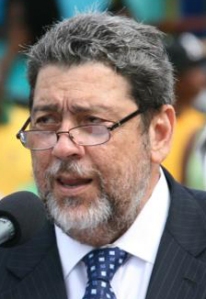
KINGSTOWN, St. Vincent – Even before the process begins, Prime Minister Dr. Ralph Gonsalves is anticipating objections to Robert Milton Cato, the first prime minister after Independence, being made a National Hero, possibly next year.
Gonsalves said at the Unity Labour Party (ULP) Women’s Arm convention yesterday that party supporters must ready themselves to make the case for Cato’s ascension to the nation’s highest office.
The Prime Minister announced during his Independence Address on Thursday, that his government would next year “commence the process to elevate one or more persons to pantheon of National Heroes”.
He did not identify the persons his government has in mind to join Joseph Chatoyer, whom the ULP declared a National Hero in 2002.
However, Gonsalves said yesterday that George Augustus McIntosh (1886-1963), Ebenezer Theodore Joshua (1908-1991), and Cato (1915-1997) were “obvious” candidates to become National Heroes.
“I know that they have some persons like Kenneth John and Bassy Alexander … and they were campaigning against, for instance, Milton Cato to be a national hero,” Gonsalves said of the two newspaper columnists.
“Well, they have their opinion, but I have mine. And I am the Prime Minister. It doesn’t mean that their opinion is not important. But don’t tell me that because I am Prime Minister I mustn’t have an opinion,” Gonsalves further stated.
He noted that the law outlines the process through which one can become a national hero. “But, I am saying to you, that I consider that Joshua and Cato are good candidates. McIntosh’s name had been mentioned,” Gonsalves said.
He said that ULP supporters should not “feel shy about promoting” Cato, who was also the nation’s first premier, for national heroism.
“I want you, while you are considering other persons, to give consideration to the founding father,” Gonsalves urged ULP supporters.
He said that Cato, of the St. Vincent Labour Party (SVLP) “played an excellent hand, an extraordinary hand” in the nation’s history.
The SVLP merged with Gonsalves’ Movement for National Unity in 1994 to form the ULP, three years before Cato died.
He excused Cato’s “weaknesses”, which he did not identify, adding, “He is a human being. Chatoyer also had weaknesses and made mistakes.
“He (Cato) is a candidate for national hero, not for saint. If it was for saint, you would have a different set of criteria,” Gonsalves said.
“And the Catholic Church, they have their criteria for saint …. Our process is laid down in the law, the relevant committee has to be appointed, recommendations have to be made to Cabinet, discussions with the public and so on and so forth,” Gonsalves explained.
“The law lays down what is the procedure and we will address that process as I announced it because we have to honour those who have made extraordinary contributions,” Gonsalves further said.
The candidates
George Augustus McIntosh (1886-1963) was a founder member of the St. Vincent Representative Government Association in 1919, which championed the rights of black Vincentians. In 1936, McIntosh was also among the prominent men who founded the St. Vincent Workingmen’s Cooperative Association, both a trade union and political party that won five seats in the election the following year. In 1939 he started his fight against an Act, which prohibited the Shaker Religion (Spiritual Baptists). An SVG Coast Guard vessel was named for McIntosh.

Ebenezer Theodore Joshua (1908-1991) returned to St. Vincent in 1951 from Trinidad and Guyana and entered the 1951 general elections winning his seat for the Eight Army of Liberation in North Windward. In 1952 he formed the People’s Political Party and the Federated Industrial and Agricultural Workers Union. Joshua, who remained a Member of Parliament for 38 years, was well loved by poor Vincentians and is widely regarded as a champion of the working class and a national hero. As Chief Minister, he defended the rights of Vincentians and spoke out against outside and colonial rule and secured many of the rights and benefits Vincentians enjoy today, including holidays with pay. The E.T. Joshua Airport is named for Joshua.

Robert Milton Cato (1915-1997), St. Vincent’s first Premier and its first Prime Minister, was elected Chief Minister in 1967, as head of the St. Vincent Labour Party. He did much to improve the economic standing of the country but was out of office from 1972 to 1974 following his party’s defeat in the 1972 election. In December 1974, the Labour Party was re-elected to office and Cato set about introducing an upward trend in the economy and ensuring an element of general confidence at home and abroad in the integrity of the state. In 1978, he invited the public to submit proposals for incorporation in an Independence Constitution and in September and led the country to independence the following year. Cato retired from active politics following his party’s defeat in the 1984 general elections, which saw the New Democratic Party ruling the country until March 2001. The Milton Cato Memorial Hospital is named from Cato.





